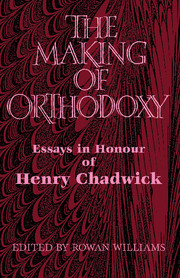Book contents
- Frontmatter
- Contents
- Preface
- List of abbreviations
- Bibliography of Henry Chadwick
- Does it make sense to speak of pre-Nicene orthodoxy?
- ‘And I have other sheep’ – John 10:16
- Reason and the rule of faith in the second century ad
- Adam in Origen
- Panegyric, history and hagiography in Eusebius' Life of Constantine
- Matthew 28:19, Eusebius, and the lex orandi
- The achievement of orthodoxy in the fourth century ad
- Eunomius: hair-splitting dialectician or defender of the accessibility of salvation?
- Some sources used in the De Trinitate ascribed to Didymus the Blind
- The rhetorical schools and their influence on patristic exegesis
- Pelagianism in the East
- The legacy of Pelagius: orthodoxy, heresy and conciliation
- Augustine and millenarianism
- Divine simplicity as a problem for orthodoxy
- The origins of monasticism
- Artistic idiom and doctrinal development
- Index of modern names
- Index of ancient and medieval names
- Index of sources
Augustine and millenarianism
Published online by Cambridge University Press: 08 October 2009
- Frontmatter
- Contents
- Preface
- List of abbreviations
- Bibliography of Henry Chadwick
- Does it make sense to speak of pre-Nicene orthodoxy?
- ‘And I have other sheep’ – John 10:16
- Reason and the rule of faith in the second century ad
- Adam in Origen
- Panegyric, history and hagiography in Eusebius' Life of Constantine
- Matthew 28:19, Eusebius, and the lex orandi
- The achievement of orthodoxy in the fourth century ad
- Eunomius: hair-splitting dialectician or defender of the accessibility of salvation?
- Some sources used in the De Trinitate ascribed to Didymus the Blind
- The rhetorical schools and their influence on patristic exegesis
- Pelagianism in the East
- The legacy of Pelagius: orthodoxy, heresy and conciliation
- Augustine and millenarianism
- Divine simplicity as a problem for orthodoxy
- The origins of monasticism
- Artistic idiom and doctrinal development
- Index of modern names
- Index of ancient and medieval names
- Index of sources
Summary
Augustine's disavowal, in Book xx of De civitate Dei, of a materialistic understanding of the thousand-year reign of Christ with His saints, as prophesied in Revelation 20:4, is undoubtedly a symbolic gesture in the intellectual history of Western Christendom. ‘He marks…a decisive moment of western thought, in which it frees itself from a paralysing archaism and turns to an autonomous creation’, is the verdict of Jean Daniélou. Nevertheless, the effect of Augustine's change of mind should not be exaggerated. Millenarian eschatological hopes and ideas survived, to find expression in the prophecies ascribed to Joachim of Flora and, later, in the ideology of the Anabaptist movement, thereafter to find their way, in a secular and anti-religious guise, into philosophies like Marxism and anarchism, as a consequence of the apparently ineradicable human longing for a state of perfection to be enjoyed upon this earth by the elect, however the elect may be defined. It is, of course, undeniable, given the influence of Augustine's theology on mediaeval thought, that professional theologians would have followed his lead in rejecting a literal understanding of the thousand-year reign; but a doubt remains. Was Augustine's rejection of millenarianism as uncompromising as is generally assumed?
- Type
- Chapter
- Information
- The Making of OrthodoxyEssays in Honour of Henry Chadwick, pp. 235 - 254Publisher: Cambridge University PressPrint publication year: 1989

